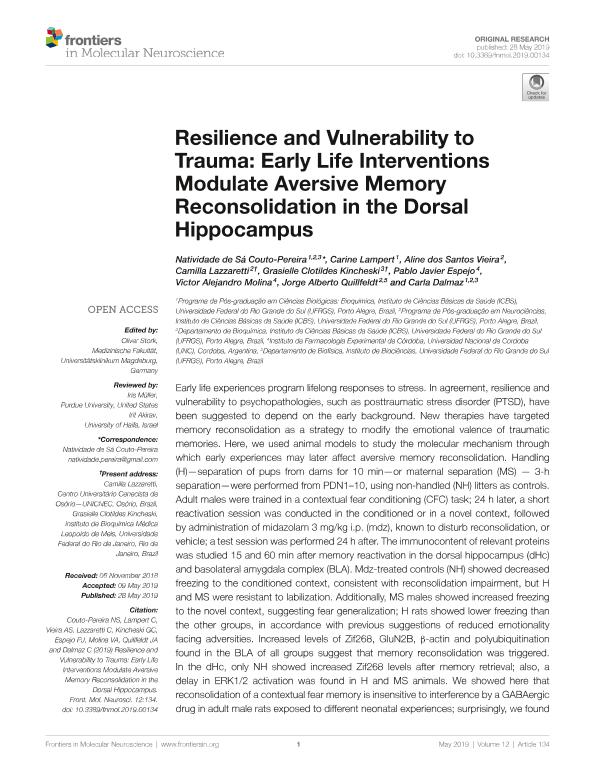Mostrar el registro sencillo del ítem
dc.contributor.author
de Sá Couto Pereira, Natividade
dc.contributor.author
Lampert, Carine
dc.contributor.author
dos Santos Vieira, Aline
dc.contributor.author
Lazzaretti, Camilla
dc.contributor.author
Kincheski, Grasielle Clotildes
dc.contributor.author
Espejo, Pablo Javier

dc.contributor.author
Molina, Victor Alejandro

dc.contributor.author
Quillfeldt, Jorge Alberto
dc.contributor.author
Dalmaz, Carla
dc.date.available
2023-01-30T15:55:05Z
dc.date.issued
2019-05
dc.identifier.citation
de Sá Couto Pereira, Natividade; Lampert, Carine; dos Santos Vieira, Aline; Lazzaretti, Camilla; Kincheski, Grasielle Clotildes; et al.; Resilience and vulnerability to trauma: Early life interventions modulate aversive memory reconsolidation in the dorsal hippocampus; Frontiers Media; Frontiers in Molecular Neuroscience; 12; 5-2019; 1-19
dc.identifier.issn
1662-5099
dc.identifier.uri
http://hdl.handle.net/11336/186130
dc.description.abstract
Early life experiences program lifelong responses to stress. In agreement, resilience and vulnerability to psychopathologies, such as posttraumatic stress disorder (PTSD), have been suggested to depend on the early background. New therapies have targeted memory reconsolidation as a strategy to modify the emotional valence of traumatic memories. Here, we used animal models to study the molecular mechanism through which early experiences may later affect aversive memory reconsolidation. Handling (H)—separation of pups from dams for 10 min—or maternal separation (MS) — 3-h separation—were performed from PDN1–10, using non-handled (NH) litters as controls. Adult males were trained in a contextual fear conditioning (CFC) task; 24 h later, a short reactivation session was conducted in the conditioned or in a novel context, followed by administration of midazolam 3 mg/kg i.p. (mdz), known to disturb reconsolidation, or vehicle; a test session was performed 24 h after. The immunocontent of relevant proteins was studied 15 and 60 min after memory reactivation in the dorsal hippocampus (dHc) and basolateral amygdala complex (BLA). Mdz-treated controls (NH) showed decreased freezing to the conditioned context, consistent with reconsolidation impairment, but H and MS were resistant to labilization. Additionally, MS males showed increased freezing to the novel context, suggesting fear generalization; H rats showed lower freezing than the other groups, in accordance with previous suggestions of reduced emotionality facing adversities. Increased levels of Zif268, GluN2B, β-actin and polyubiquitination found in the BLA of all groups suggest that memory reconsolidation was triggered. In the dHc, only NH showed increased Zif268 levels after memory retrieval; also, a delay in ERK1/2 activation was found in H and MS animals. We showed here that reconsolidation of a contextual fear memory is insensitive to interference by a GABAergic drug in adult male rats exposed to different neonatal experiences; surprisingly, we found no differences in the reconsolidation process in the BLA, but the dHc appears to suffer temporal desynchronization in the engagement of reconsolidation. Our results support a hippocampal-dependent mechanism for reconsolidation resistance in models of early experiences, which aligns with current hypotheses for the etiology of PTSD.
dc.format
application/pdf
dc.language.iso
eng
dc.publisher
Frontiers Media

dc.rights
info:eu-repo/semantics/openAccess
dc.rights.uri
https://creativecommons.org/licenses/by-nc-sa/2.5/ar/
dc.subject
BASOLATERAL AMYGDALA
dc.subject
DORSAL HIPPOCAMPUS
dc.subject
FEAR MEMORY
dc.subject
MATERNAL SEPARATION
dc.subject
NEONATAL HANDLING
dc.subject
RECONSOLIDATION
dc.subject.classification
Neurociencias

dc.subject.classification
Medicina Básica

dc.subject.classification
CIENCIAS MÉDICAS Y DE LA SALUD

dc.title
Resilience and vulnerability to trauma: Early life interventions modulate aversive memory reconsolidation in the dorsal hippocampus
dc.type
info:eu-repo/semantics/article
dc.type
info:ar-repo/semantics/artículo
dc.type
info:eu-repo/semantics/publishedVersion
dc.date.updated
2023-01-30T11:13:41Z
dc.journal.volume
12
dc.journal.pagination
1-19
dc.journal.pais
Estados Unidos

dc.description.fil
Fil: de Sá Couto Pereira, Natividade. Universidade Federal do Rio Grande do Sul; Brasil
dc.description.fil
Fil: Lampert, Carine. Universidade Federal do Rio Grande do Sul; Brasil
dc.description.fil
Fil: dos Santos Vieira, Aline. Universidade Federal do Rio Grande do Sul; Brasil
dc.description.fil
Fil: Lazzaretti, Camilla. Universidade Federal do Rio Grande do Sul; Brasil
dc.description.fil
Fil: Kincheski, Grasielle Clotildes. Universidade Federal do Rio Grande do Sul; Brasil
dc.description.fil
Fil: Espejo, Pablo Javier. Consejo Nacional de Investigaciones Científicas y Técnicas. Centro Científico Tecnológico Conicet - Córdoba. Instituto de Farmacología Experimental de Córdoba. Universidad Nacional de Córdoba. Facultad de Ciencias Químicas. Instituto de Farmacología Experimental de Córdoba; Argentina
dc.description.fil
Fil: Molina, Victor Alejandro. Consejo Nacional de Investigaciones Científicas y Técnicas. Centro Científico Tecnológico Conicet - Córdoba. Instituto de Farmacología Experimental de Córdoba. Universidad Nacional de Córdoba. Facultad de Ciencias Químicas. Instituto de Farmacología Experimental de Córdoba; Argentina
dc.description.fil
Fil: Quillfeldt, Jorge Alberto. Universidade Federal do Rio Grande do Sul; Brasil
dc.description.fil
Fil: Dalmaz, Carla. Universidade Federal do Rio Grande do Sul; Brasil
dc.journal.title
Frontiers in Molecular Neuroscience
dc.relation.alternativeid
info:eu-repo/semantics/altIdentifier/url/https://www.frontiersin.org/articles/10.3389/fnmol.2019.00134/full
dc.relation.alternativeid
info:eu-repo/semantics/altIdentifier/doi/http://dx.doi.org/10.3389/fnmol.2019.00134
Archivos asociados
